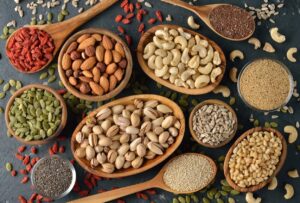Managing Polycystic Ovary Syndrome (PCOS) and hormonal imbalances can be challenging for many women, as symptoms can range from weight gain and acne to mood changes and irregular menstrual cycles. While there isn’t a single cure, following a balanced diet tailored to PCOS can significantly help alleviate symptoms and improve overall health. Diets rich in anti-inflammatory foods, low-glycaemic index options, and healthy fats can help regulate hormones, reduce insulin resistance, and support weight management—all crucial for managing PCOS. A well-planned diet offers not only symptom relief but also a sustainable lifestyle that nurtures long-term health and vitality. In this blog, we’ll explore an effective diet plan for managing PCOS and hormonal imbalance, with a focus on key foods that support hormonal health.
Diet Plan for Managing PCOS and Hormonal Imbalance
1.Leafy Greens

Leafy greens like spinach, kale, and Swiss chard are packed with vitamins, minerals, and antioxidants that support hormone health. They’re also low in calories and have a low glycaemic index, making them ideal for blood sugar control and weight management.
2.Whole Grains

Whole grains like oats, quinoa, and brown rice digest slowly, helping to maintain stable blood sugar levels. Their low glycaemic index and high fibre content can also reduce insulin spikes, which are common in those with PCOS.
3.Berries

Blueberries, strawberries, and raspberries are rich in antioxidants and fibre, providing a natural way to satisfy sugar cravings without spiking insulin. Berries are also anti-inflammatory, which can ease PCOS symptoms over time.
4.Nuts and Seeds

Walnuts, almonds, chia seeds, and flaxseeds are rich in omega-3 fatty acids, fibre, and healthy fats that support hormone balance. Nuts and seeds can also help control hunger and prevent overeating.
5.Fatty Fish

Salmon, mackerel, and sardines are excellent sources of omega-3 fatty acids, known to reduce inflammation and improve insulin sensitivity. Regular intake of fatty fish can contribute to hormonal balance and heart health.
6.Lean Proteins

Chicken, turkey, tofu, and eggs are rich in protein and help keep you full, reducing cravings for sugary or processed foods. Protein is essential for stabilising insulin levels and building lean muscle.
7.Avocado

Avocados are loaded with healthy fats and fibre that promote blood sugar stability and hormone production. Adding avocado to meals can provide satiety and support metabolic health.
8.Turmeric and Ginger

Turmeric and ginger are known for their anti-inflammatory properties. They can be added to meals or tea to help reduce inflammation and support digestive health.
9.Green Tea

Green tea is high in antioxidants and can aid in weight management. It’s also been shown to improve insulin resistance, which is crucial for managing PCOS.
10.High-Fibre Vegetables

Vegetables like broccoli, cauliflower, and carrots provide fibre that supports digestion and helps maintain stable blood sugar levels.
Conclusion
A balanced diet can play a transformative role in managing PCOS and hormonal imbalances. By focusing on whole foods, low-glycaemic choices, and anti-inflammatory ingredients, you can alleviate symptoms, reduce inflammation, and support your overall well-being. While dietary changes won’t cure PCOS, a consistent and mindful approach to nutrition can offer significant relief and improve your quality of life. Pairing these dietary changes with a healthy lifestyle and regular physical activity will foster long-term health benefits and sustainable symptom management.
Frequently Asked Questions on Managing PCOS Through Diet
1.How can diet affect PCOS symptoms?
Answer: A balanced diet helps manage insulin levels, inflammation, and hormone regulation, all of which can improve PCOS symptoms and reduce their intensity.
2.Which foods should I avoid if I have PCOS?
Answer: Avoid processed foods, sugary snacks, refined carbs, and trans fats, as they can aggravate insulin resistance and cause hormonal fluctuations.
3.How soon will dietary changes impact my PCOS symptoms?
Answer: Some individuals notice improvements within a few weeks, but it may take several months for others. Consistency with dietary changes is key to seeing long-term benefits.
4.Is it necessary to lose weight to manage PCOS?
Answer: Even a small amount of weight loss can improve symptoms, as it helps with insulin sensitivity and reduces inflammation, which are both beneficial for managing PCOS.
5.What is the role of exercise in managing PCOS?
Answer: Exercise can help regulate blood sugar, improve insulin sensitivity, and support weight management, all of which are essential for reducing PCOS symptoms.










